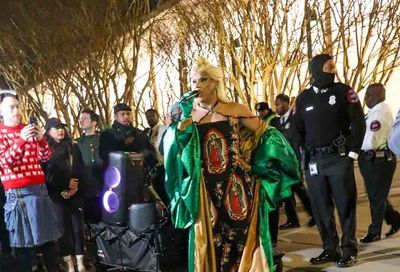Stand by Your (Gay Marriage) Ban
The Marshall-Newman Amendment will stay embedded in Virginia's constitution for at least 3 more years

Despite marriage equality now being the law of the land in Virginia, Republican lawmakers are stubbornly keeping the language of the constitutional amendment that once banned the practice in place for at least three more years, if not longer.
The Virginia Senate Committee on Privileges and Elections split 8-7 along party lines on Tuesday evening, deciding to adopt the recommendations of a subcommittee that had voted 4-2 in a voice vote earlier in the day to reject a trio of bills — SJR213, patroned by Sen. Janet Howell (D-Reston, Tysons Corner, Arlington), SJR 214, patroned by Sen. Adam Ebbin (D-Alexandria, Arlington, Belle Haven) and SJR 283, patroned by Sen. Don McEachin (D-Richmond City, Ashland, Charles City) — that would have begun the process of repealing Virginia’s now-defunct Marshall Newman Amendment, a voter-approved constitutional amendment from 2006 that prohibited any form of recognition of a same-sex relationship or contract between two unmarried partners of the same gender.
The process of amending the Virginia constitution is quite complicated. Under Virginia law, a proposed constitutional amendment must successfully pass during two separate legislative sessions that are separated by an election. If approved in both sessions, often by different legislatures, the proposed change to the constitution must then be approved by a majority of voters via a ballot measure. By rejecting efforts to repeal Marshall-Newman, Republicans on the committee have ensured that the discriminatory language will remain in the Virginia constitution for at least three years. The voters’ first chance to repeal the amendment would be in 2018 at the earliest. In order for that to happen, members of the Virginia General Assembly would have to vote to approve the repeal process prior to the 2017 elections for House of Delegates and statewide offices. Then, the newly-elected or re-elected members of the legislature would also have to approve the repeal process, which would merely put the issue on the ballot, at which point a majority of voters would have to approve the motion to repeal the amendment. Given the monumental edge that Republicans enjoy in the House of Delegates, and the gerrymandered nature of many House districts, that likely means it could be decades, not years, before the Virginia General Assembly approves the beginning of the repeal process, if at all.
Measures similar to the bills considered by the committee have been introduced in the House of Delegates by Del. Scott Surovell (D-Mount Vernon, Fort Hunt, Hybla Valley) and Del. Rob Krupicka (D-Alexandria, Belle Haven, Arlington), but are expected to fail in the House of Delegates, which is even more hostile to LGBT rights than the Senate.
The eight senators who voted against the bills were Senators Jill Holtzman Vogel (R-Upperville, Winchester, Aldie, Jeffersonton); Steve Martin (R-Chesterfield, Colonial Heights, Amelia Court House); Mark Obenshain (R-Harrisonburg, Luray, Front Royal); Ralph Smith (R-Roanoke, Salem, Christiansburg, Austinville); Bill Carrico (R-Galax, Abingdon, Bristol, Gate City); Bryce Reeves (R-Spotsylvania, Fredericksburg, Louisa, Culpeper); Tom Garrett (R-Lynchburg, Appomattox, Farmville, Cumberland); and John Cosgrove (R-Chesapeake, Virginia Beach, Suffolk, Franklin). Martin, Smith, Reeves and Garrett had earlier voted in subcommiteee to recommend tabling the measure.
Practically, the committee’s vote has no effect on the ability of same-sex couples to marry in the commonwealth. The Marshall-Newman Amendment, as well as an underlying statutory ban on same-sex marriage, have both been declared unconstitutional by both a federal district judge and the 4th U.S. Circuit Court of Appeals. Following the U.S. Supreme Court’s decision not to hear an appeal of the case, Attorney General Mark Herring (D) and Gov. Terry McAuliffe (D) ordered state officials and local county clerks to begin recognizing same-sex marriages and granting licenses to same-gender couples. What the committee vote will do, though, is give conservatives bragging rights and a vote that they can use to appease social conservatives in the hope of avoiding a primary challenge in this year’s legislative elections. Groups like the Family Foundation of Virginia issue “report cards” grading lawmakers on whether they have supported a range of socially conservative pieces of legislation, and make recommendations to their followers regarding whether to support certain lawmakers.
Support Metro Weekly’s Journalism
These are challenging times for news organizations. And yet it’s crucial we stay active and provide vital resources and information to both our local readers and the world. So won’t you please take a moment and consider supporting Metro Weekly with a membership? For as little as $5 a month, you can help ensure Metro Weekly magazine and MetroWeekly.com remain free, viable resources as we provide the best, most diverse, culturally-resonant LGBTQ coverage in both the D.C. region and around the world. Memberships come with exclusive perks and discounts, your own personal digital delivery of each week’s magazine (and an archive), access to our Member's Lounge when it launches this fall, and exclusive members-only items like Metro Weekly Membership Mugs and Tote Bags! Check out all our membership levels here and please join us today!






















You must be logged in to post a comment.